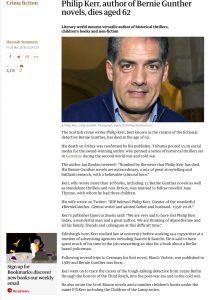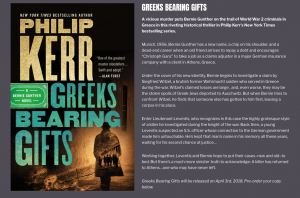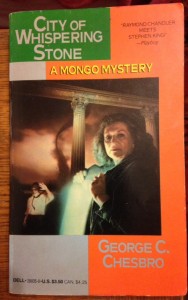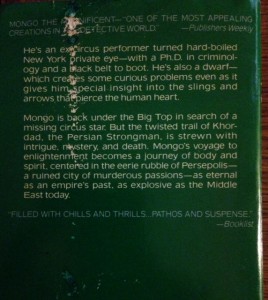Saying Goodbye to Philip Kerr, a Favorite Novelist, and Hoping for One More Bernie Gunther Novel
 March 26 Update from Publishers Lunch:
March 26 Update from Publishers Lunch:
Philip Kerr, 62, author of the Bernie Gunther crime novels and many other works of fiction for adults and children, died Friday of cancer. Putnam will publish his newest series novel, Greeks Bearing Gifts, on April 3, and Kerr had finished a draft of the next Gunther novel, Metropolis, slated for publication next year. Kerr’s longtime editor, Marian Wood, said in a statement: “Working with Philip Kerr was the kind of experience all editors hope to have. In the twenty-plus years we worked together I found him responsive, funny, brilliant, and totally committed to his writing and hence, to being edited as long as he thought the editing was serious. He was an amazing human being and I will always miss him. At the moment, there is a huge hole in my life. I suspect it will stay with me as long as he lives in my memory–which means, as long as I live.”
—-
 So deeply saddened by the sudden death at age 62 of the hugely talented novelist Philip Kerr, creator of the outstanding 11-book Bernie Gunther detective series. I’ve read Kerr’s books since the Berlin Noir Trilogy, featuring the Berlin police detective Gunther began appearing in 1989. In 2012 I wrote a blog post “Loving Philip Kerr’s Bernie Gunther Novels” where I shared this video from his website:
So deeply saddened by the sudden death at age 62 of the hugely talented novelist Philip Kerr, creator of the outstanding 11-book Bernie Gunther detective series. I’ve read Kerr’s books since the Berlin Noir Trilogy, featuring the Berlin police detective Gunther began appearing in 1989. In 2012 I wrote a blog post “Loving Philip Kerr’s Bernie Gunther Novels” where I shared this video from his website:
Another time I wrote this about a later Gunther novel, Field Gray:
“Field Gray, a Bernie Gunther novel, features the detective who’s navigated the amoral world of Berlin before, during, and after WWII in seven magnificent books. The latest has especially brilliant plotting, w/the narrative taking Gunther and his memory through all the war years as he endures harsh interrogation from Yanks who arrest him in Cuba in 1954. I find inflections of the Guantanamo and Abu Ghraib prison camps in the book. Kerr is a master. If you’ve never read a Bernie Gunther novel, I urge you to begin the series. March Violets is the first, and I do recommend you read them in order, though I supposed one could also just start with Field Gray.”
I woke this morning to find that a friend who knows how much I enjoy Kerr’s books had tagged me in a Facebook post linking to the brief obituary of Kerr from the Guardian pasted in here; I’m sure there will be many full tributes to come. Kerr wrote other books, as well, including a very good dystopian novel called The Second Angel. In an newsletter emailed to his readers last year, he wrote that there would be a new Bernie Gunther title out in spring 2018, Greeks Bearing Gifts. I see a cover for the US edition is on his website, which as of tonight does not yet mention his passing. I hope he was able to see the printed book before he died. My condolences to his family, and his US editor Marian Wood. 


